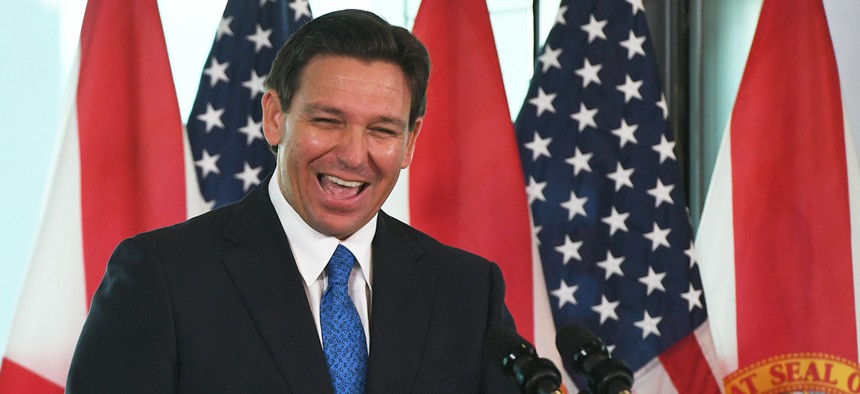Politics
Florida Gov. Ron DeSantis' budget debut hits political pressure points
Is his proposed 2023-24 state spending plan, dubbed 'Framework for Freedom,' also a framework for a 2024 presidential run?

Florida Gov. Ron DeSantis laughs during a press conference to announce the Moving Florida Forward initiative at the SunTrax Test Facility in Auburndale. Photo by Paul Hennessy/SOPA Images/LightRocket via Getty Images
Florida Gov. Ron DeSantis on Wednesday delivered his annual budget proposal in front of a room full of not only reporters but also state workers that were instructed to clap and be high energy. But as he grabbed the lectern, DeSantis smiled and said, “I didn’t realize there would be an audience.”
Regardless of the audience, the second-term governor performed for a national one during the roughly 45-minute event. Even though he has deflected questions about his future aspirations, his budget rollout came as he leads in polls for 2024’s Republican primary and as he reportedly already is assembling a campaign staff.
Bluntly put, DeSantis highlighted items in his 406-page, record $114.8 billion proposed state budget that would get Republicans across the country daydreaming about him moving into 1600 Pennsylvania Avenue. He also answered media questions with his usual sharpness, like someone looking to generate sound bites.
To be sure, the governor’s proposed spending plan is his wish list; the budget for 2023-24 will be hashed out and OK’d by lawmakers, with DeSantis having line-item veto authority. Whatever makes it into the final product by the end of this year’s 60-day regular legislative session, which kicks off March 7, here are some of the ‘culture war’ and national issues he touched on during his press conference:
Fire it up
His plan includes a permanent sales tax exemption for gas stoves. The kitchen appliance has been at the center of national conservative culture wars after the U.S. Consumer Product Safety Commission considered banning them.
He brought that up and doubled down when asked a question about climate change, saying attempts to ban the stoves were a way for the Biden-controlled federal government to curtail freedom. “They use that to control. What we don't do in Florida is embrace things to just try to control people,” DeSantis said.
It's again worth noting: The U.S. Energy Information Administration says only 8% of households in the Sunshine State have natural gas stoves – the lowest rate in the nation, tied with Maine.
Close that border
The proposal includes $12 million to continue the migrant relocation program, or “Unauthorized Alien Transport Program,” that made headlines after sending migrants from Texas through Florida to Martha’s Vineyard last year.
When asked about the funding during the press conference, DeSantis said the program acts as a deterrent and is also fighting the smuggling of illicit drugs into the country.
“That border is affecting communities all across this country. Just look at the number of fentanyl deaths we have seen the last few years,” DeSantis said. Mentions of fentanyl in connection to immigration have been popular in right-wing media and among GOP politicians for months.
Fighting the ‘woke’ in academia
Using the same playbook he used the day before, DeSantis repeated his vision of reshaping the New College of Florida. But when asked by a reporter how his administration would remove diversity, equity and inclusion offices from Florida universities, he said he’s encouraging the Legislature to write and pass legislation disbanding DEI offices.
Attacks on DEI have been popular with national conservatives, with conservative think tanks like the Heritage Foundation inveighing against it.
Law and order
DeSantis’ plan is also throwing big bucks at state law enforcement agencies. His proposal includes a $124 million recommendation for salary increases across several areas of state law enforcement, as well as $100 million for the second year of the Hometown Heroes Housing Program.
Those policies, as well as DeSantis’ recently debuted tough-on-crime legislative package, appeal to the national conservative base, who largely support increased police funding and more aggressive policing and were turned off by calls to ‘defund the police’ that came out of the Black Lives Matter movement in recent years.
Mo’ money than California
DeSantis bragged that state reserves in his budget would be over $15 billion while California – helmed by the Democrats’ political star from the left, Gavin Newsom – is dealing with a budget deficit over $20 billion.
He also dinged the feds by pointing out the last national surplus was in 2001 and took a dig at members of Congress, such as U.S. Sen. Rick Scott, who have been calling for the state to return some of its unspent COVID-19 stimulus money. “Why don’t they get their house in order? Why don’t they stop spending so much of our money?” DeSantis said.
To be sure, the national debt has been central to Republican messaging over the past few decades but has seen diminished returns in recent years.
Clamping down on The Mouse
Near the end of the press conference, DeSantis answered a question about Walt Disney’s Reedy Creek Improvement District, saying he still supports its dissolution and replacement by a state-controlled board. The company had used it for decades to self-govern its Walt Disney World and surrounding property.
“We are not going to have a corporation controlling its own government,” DeSantis said. “Disney will not have self-governing status anymore.”
Those in the right across the country have decried Disney for going “too woke” with its corporate stances and products, and the wrath around Reedy Creek was first brought up after they opposed the Parental Rights in Education legislation, which critics dubbed “Don’t Say Gay,” that became law last year.
Contact Tristan Wood at twood@cityandstatefl.com and follow him on Twitter: @TristanDWood.
NEXT STORY: DeSantis' current education battles keep culture wars alive
